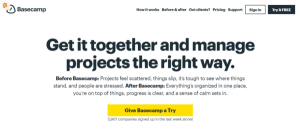
Don’t you hate it when no-one answers your questions?
If that does happen, are you likely to stick around in a state of temporary confusion, or go elsewhere for the answers you need?
Buying a conservatory is usually a big decision – and a considerable investment – which means your customers are going to need help in making sure their decision is the right one for them.
In fact, 61% of consumers look to content such as articles and blogs for information about potential purchases.
One thing is certain: If you’re not able to answer their basic questions in the form of quality content on your site, someone else will.
That’s why I’ve put together the following list of questions every conservatory company should answer on their website or blog.
The buyer’s journey
In order to understand what challenges your customers may be facing, we have to first look at the buyer’s journey.
There are three main stages of the buyer’s journey:
- Awareness: The initial research stage, in which your customers recognise that they have a problem
- Consideration: They begin looking for a solution to that problem
- Decision: They weigh up their options before finally making a decision
Answering their questions at ANY stage of the buyer’s journey will help to build your customers’ trust, and establish your authority.
I’ve separated the questions below into different stages of the buyer’s journey.
Awareness stage questions
1. What problems can your conservatories solve?
Don’t simply bombard them with solutions. By recognising the problems your customers face and acknowledging them, you’ll find customers can more easily identify that you are in fact speaking to them. You can then work to provide potential solutions to their problems.
2. Is a conservatory right for me?
Let’s be honest, not everyone who lands on your site will know if a conservatory is the right choice for them. Don’t just try to sell – instead, take the time to address the possible challenges your customers might be facing, and help them decide whether a conservatory really is the right choice.
3. What is the best conservatory for my needs?
By providing information on the different types of conservatories available, you will help potential customers to narrow down their options. They’ll become more informed about which type of conservatory is best suited to their needs.
Consideration stage questions
4. Where can I get a conservatory?
If you think the answer to this is ‘right here on my website’, you’re getting it wrong. Instead, highlight the various buying options available, and why these options work for different scenarios. And yes, it could mean taking a look at some of your competitors.
5. What are the different options for materials?
Not all conservatories are built using the same materials, so what are the options available, and the benefits of each? Which will best protect against bad weather? Which are the cheapest? Which will help them to get the most out of their conservatories in summer AND winter?
6. How long will it take to install a conservatory?
It’s true that this question may depend on the style of conservatory and property, but it’s still important to give potential customers a rough idea of how long it might take and what could impact that timescale.
7. Will I need planning permission?
This will really depend on the area, but you’ll already know this. Provide information on when a customer may need planning permission, and link to your local authority to give them a more detailed idea of the rules and regulations in place for your area.
Decision stage questions
8. What’s unique about your solution?
They may be wondering why they should choose you above your competitors, so you need to spell out what makes your conservatory solutions so different. Whether it’s your special climate-controlled conservatories, or simply going the extra mile for your customers, it will help them to make their final decision.
9. How much does it cost?
Again, this one may vary depending on numerous factors, but you still need to provide an explanation of how these costs are worked out, and perhaps even a ballpark figure so that your customers will have a good idea of whether or not your solution is in their budget.
10. What can I expect from working with you?
By outlining the various steps in your sales process, your customers will be able to make a fully-informed decision and know exactly what comes next if they do decide to buy a conservatory from you. Just make sure you follow through on your promises.
11. What do your other customers say about your service?
Finally, it’s important to provide customer testimonials and case studies so that they will have a good idea of how satisfied others were with the results. If you miss these out, it could seem like you have something to hide, potentially swinging their decision away from you and towards a more ‘trustworthy’ company.
Conclusion
No-one likes having their questions ignored, and it’s exactly the same for your customers. If you’re not able to help answer their basic questions, they’ll most likely seek answers – and ultimately buy their conservatories – elsewhere.
It’s important to think about questions potential customers will have at ANY stage of the buyer’s journey, from awareness right through to the decision stage. The questions above help to highlight some of the biggest questions your customers may need answered as they consider buying a new conservatory.
Think about the challenges your customers may face, acknowledge them, and try to come up with solutions in the form of quality content such as: web pages, blogs, ebooks, videos or infographics.
Just make sure you answer their questions.
(241)








